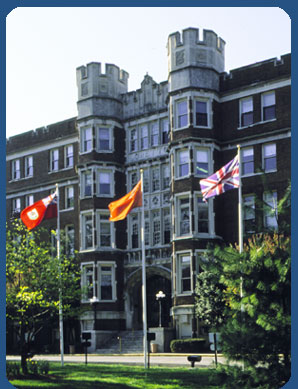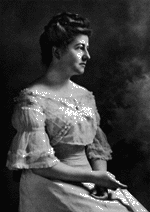| Women's Intellectual Contributions to the Study of Mind and Society Students, as part of an advanced seminar, examined and wrote about the lives of these women,
their intellectual contributions, and the unique impact and special problems that being female had
on their careers. |  |
| For information about referencing this paper - Click Here |
Dr. Ethel Puffer (Howes) (1872-1950)
by Eric W. Codak

The Puffer Family
Ethel was born in Framingham, Massachusetts on October 10, 1872. She
was the eldest of four daughters.
Her Father George, attended business school in Boston and worked as a
railroad station master for the Albany Railroad in his later years.
Her mother Ella, taught in a high school until her marriage in 1871.
Education
After Puffer completed high school, she went to Smith College,
graduating in 1891. Just 19 years old, she took a teaching job at Keene
High School in New Hampshire.
She later came back to Smith College to teach mathematics for three
years. It was at this time when she became most interested in psychology
and set out for Germany for further study in the fall of 1895.
She attended University of Berlin in 1895 and in 1896 attended the
University of Freiberg, encouraged by Hugo Munsterberg.
Puffer began to study for her Ph.D. at Harvard but being a women she
officially was considered a Radcliffe College student. This "college"
was set up just for women depicting the discrimination in Academia at
that time. Puffer finally received her Ph.D. from Radcliffe College in
1902.
Germany Bound
During the beginning of the 20th century, Germany was where many
Americans were enticed to go learn psychology, since the opportunities
for research were so great. She still though experienced the same sex
discrimination in academia as she did in America. She could not get
permission to attend classes during her stay Berlin's university .
Puffer started to attend classes without anybody's consent, knowing she
would be the only woman there.
Eventually, Puffer worked it out with the university to get official
permission to attend, that same academic year.
Hugo Munsterberg
Ethel heard of Hugo Munsterberg through a Canadian colleague in Berlin
and learned he was back teaching at the University of Freiberg in
Germany after being on a three-year appointment at Harvard. Though this
colleague she was able to set up an appointment with Munsterberg.
Ethel was interested in Munsterberg's area of study in aesthetics and
followed up by attending a course of lectures on the topic in Berlin
(Scarborough & Furumoto 78).
After meeting Hugo Munsterberg, Puffer moved to and attended Freiberg
University working with him in his laboratory. All went well and
Munsterberg agreed to house Puffer shortly after her move.
After one year of research, Munsterberg suggested her to strive for a
Doctorate.
After receiving an ACA (Association of Collegiate Alumnae) fellowship in
1897, which was sponsored by women for women, with help from Hugo, she
followed the Munsterberg family back to Harvard to work on her
dissertation for her Ph.D.
Marriage
After receiving her Ph.D., Puffer stayed in the Boston area and
taught at Radcliffe, Wellesley, and Simmons Colleges and wrote her first
book, The Psychology of Beauty in 1905.
Three years later she met and married Benjamin Howes, an event that
brought her career in psychology to a halt (Scarborough & Furumoto 82).
Later, Puffer(Howes) gave birth to two children, Ellen in 1915 and
Benjamin, Jr. in 1917.
Dilemma with Domesticity
In the early 20's, Puffer (Howes), saw the discrimination against
women with society being the cause of it. She concluded and wrote two
articles about how women can combine marriage and still have a growing
career in the Atlantic Monthly in 1922.
Institute for the Coordination of Women's Interests
In 1925, gaining interests and raising a few eyebrows with her
articles, Puffer (Howes) later received a Grant from the Laura Spelman
Rockefeller Fund and founded the Institute for the Coordination of Women's Interests. She was funded for three years and worked out of Smith College with Puffer (Howes) being Director.
The Institutes interests dealt with domestic responsibilities, mostly
with researching families through demonstration programs. The Institute
saw the need for "transforming the whole social setting and the inner
attitude toward men and women to accept the twofold need of women as
fundamental" (Scarborough & Furumoto 90).
She got some publicity when it was made known to the public that she had
a children and a career working at the Institute. Never the less, after
the three years of funding ended so did the Institute.
She made a later attempt to write on the marriage versus career issue in
The Meaning of Progress in the Women Movement in 1929.
References
- Scarborough, E. & Furumoto, L. (1987). Untold lives: The first generation of the American women psychologists. New York: Columbia University Press.
Ethel Puffer Howes' Publications
- Puffer, E. D. The psychology of beauty. Boston: Houghton Mifflin. 1905.
- Howes, E. Puffer (1922a). Accepting the universe. Atlantic Monthly 129, 444-53.
- Howes, E. Puffer (1922b). Continuity for Women. Atlantic Monthly, 130, 731-39.
- Howes, E. Puffer (1923). True and Substantial Happiness. Women's Home Companion, December Issue.
- Howes, E. Puffer (1929). The meaning of progress in the women movement. Annals of the American Academy of Political and Social Science 143, 14-20.
- Howes, E. Puffer (1937). The Golden Age. Radcliffe Quarterly 21, 14-16.
Back to Women's Page

